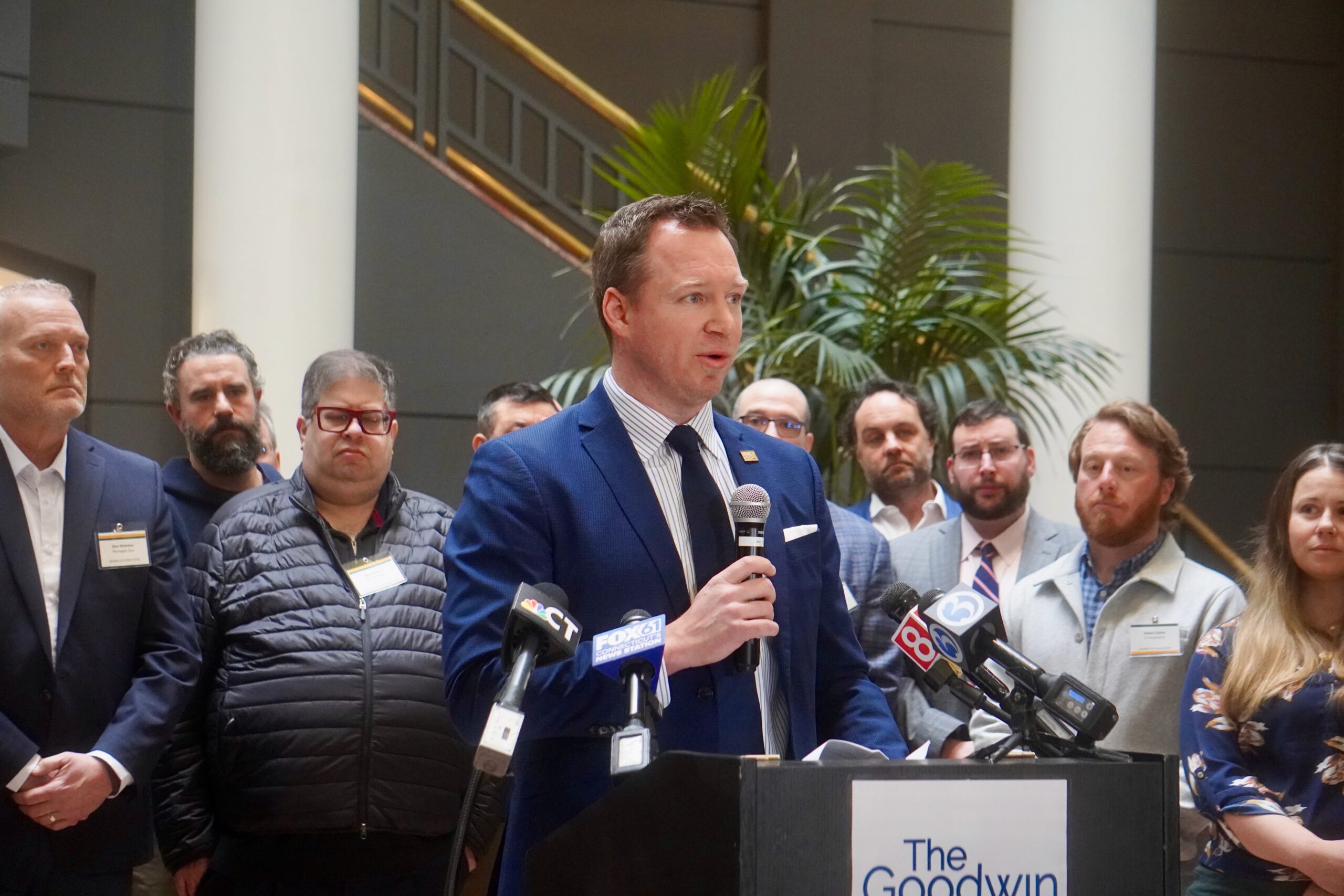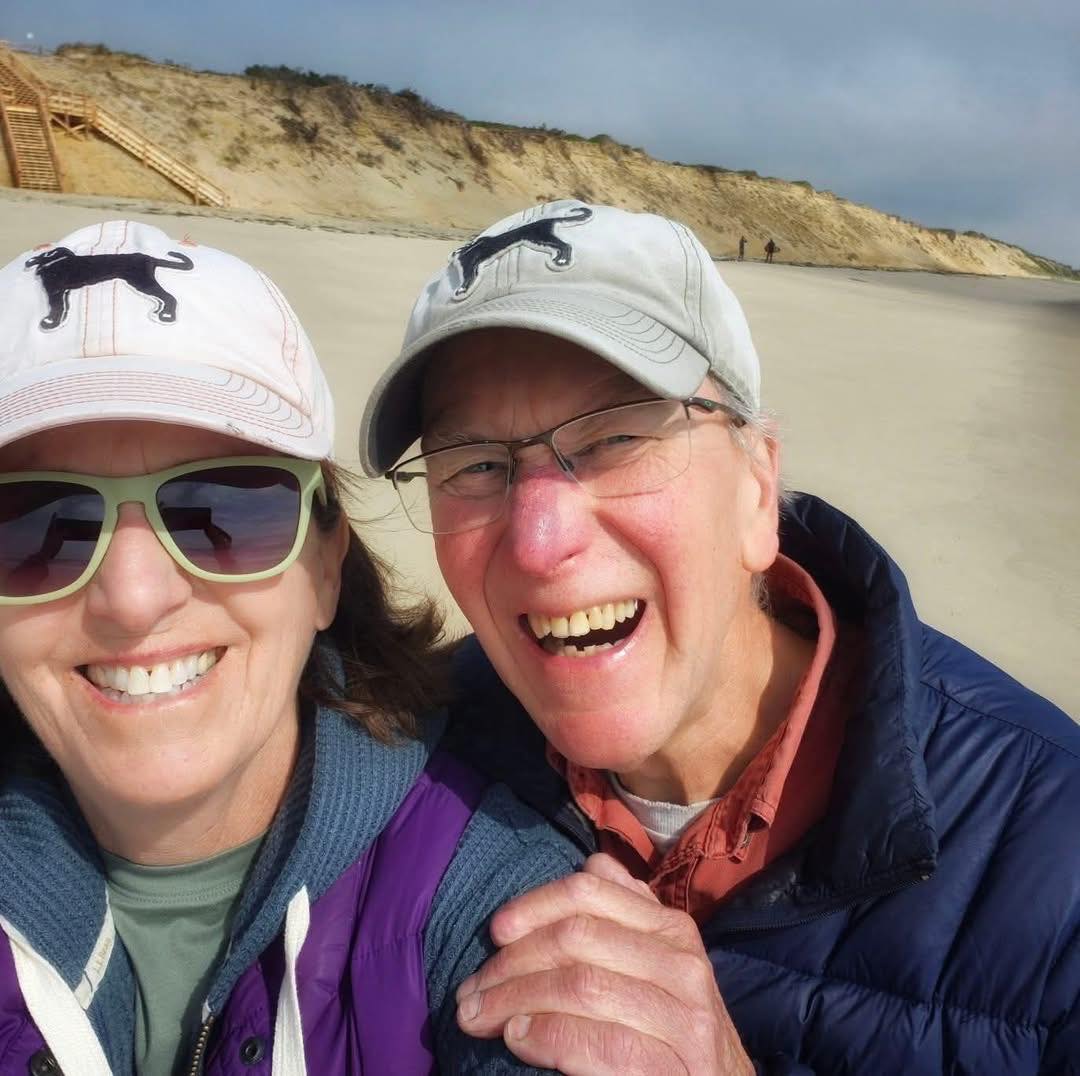Coach Jeff Billing and the Hall High ‘Coaches’ Challenge’

Audio By Carbonatix
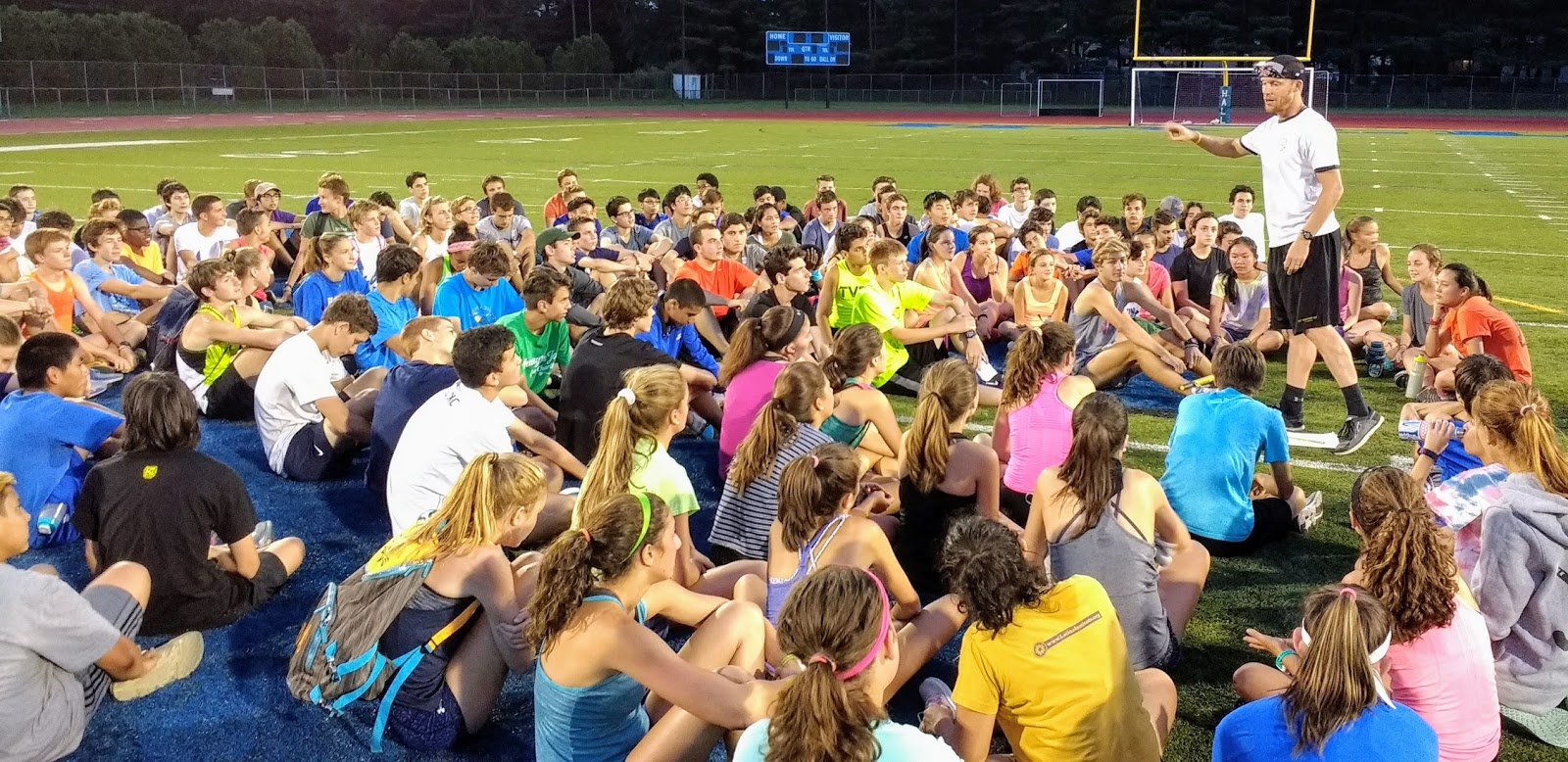
Coach Jeff Billing addresses Hall High cross-country team. Courtesy photo
Jeff Billing, the cross country coach at West Hartford’s Hall High School, has a long-standing and unique pre-season time trial to kick off the season, and this year Amby Burfoot participated, prompting this essay.
By Amby Burfoot
Editor’s note: This article was first published on AmbyBurfoot.com, and has been reproduced with permission of Amby Burfoot – author, speaker, Runner’s World editor, and 1968 Boston Marathon winner.
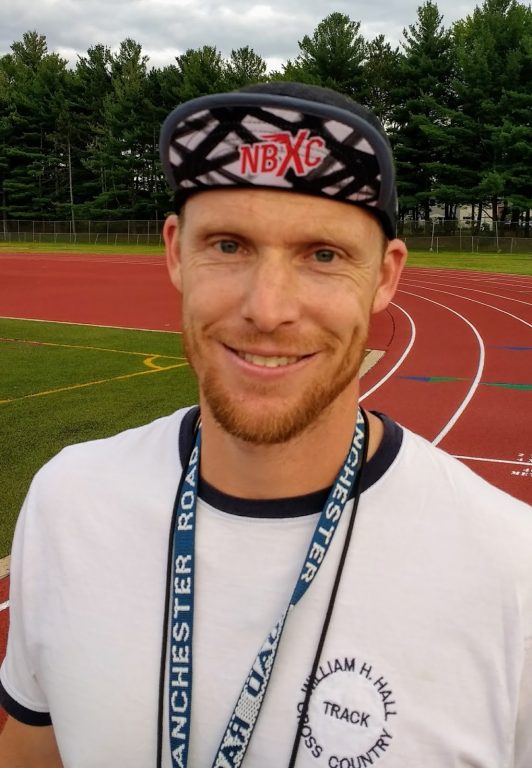
Hall High School teacher and coach Jeff Billing. Courtesy photo
Jeff has a better way. By “Jeff,” I mean Jeff Billing, the cross-country coach at Hall High School in West Hartford, CT. (Who also happens to be my nephew.) By “better way,” I’m referring to the pre-season time trial that thousands of high-school coaches use to kick off the fall season.
No doubt, the time-trial represents a long and honored tradition. Still, it has limitations. “A lot of the runners, especially the young ones, go out way too fast and blow up,” Jeff notes. “That means it’s not a good gauge of their fitness, or how to plan their training. Plus, it’s so demoralizing to the ones in the back. How can anyone pretend it’s a positive race experience for them?
Jeff calls his better way the “coaches’ challenge.” Basically, it amounts to a series of controlled-pace 3200-meter races on the track, with each runner placed in an appropriate heat. Special guests and alums are invited to pace each group. They alone are given the goal time selected by Jeff and the other Hall coaches. None of the high school runners knows what the pace will be, and they are not allowed to wear a watch.
The high schoolers receive just one instruction. “This will be the simplest race of your life,” Billing tells them. “Just stay with the pace leader as long as you can. When it starts to get hard, toughen up and hang in there. Stay with the pace.”
They are also told they can run the last lap as fast as they want. But until then, they must stay behind the pacer. No exceptions.
A week ago, when Jeff mentioned that he expected 120 runners at this year’s coaches’ challenge, I was intrigued. He said they would run in 11 different heats. Heat 1 would aim for 5:05 pace. Heat 9 would aim for 8:00 pace. “Wait a minute,” I thought. “ I can do that.”
Which explains how, Monday evening on the Hall High track, a slow and stiff-striding 71-year-old former Boston Marathon winner lined up with a bunch of 14-year-old ninth-graders. “This is going to be fun,” I told them seconds before we stepped onto the track. “Just so long as you don’t try to pass the old guy.”
My comment elicited no responses. Not even a changed expression. I scanned the kids’ faces. They looked pale and slightly frightened. “Most of them have probably never run a race of any kind before,” Jeff had told me earlier.
Before we continue, a few more words about my nephew. Jeff graduated from MIT 15 years ago with a masters degree in artificial intelligence. He quickly inked a signing bonus with one of those famous Silicon Valley outfits.
Jeff lasted two years in the big-brain world. It wasn’t that he couldn’t do the work. He just didn’t give a damn. It was so … un-fun and un-fulfilling. Jeff wasn’t born to write code. He was born to teach and coach.
Jeff quit his tech job, took a 50 percent pay cut, and began teaching math and coaching sports in a public high school. He’s been at it ever since. I’m biased of course; uncles have certain rights. But if you happen to have a youngster who’s interested in math and running, I’d suggest you check out the West Hartford real-estate listings right now.
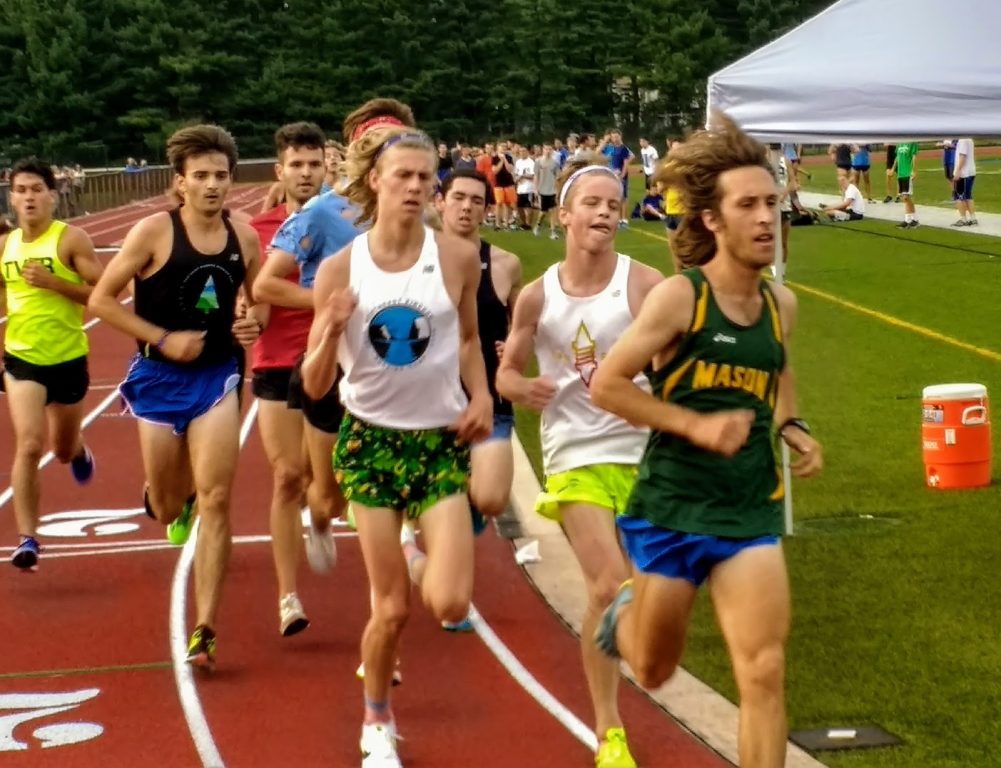
Hall runners chase Everett Hacket at the beginning of the last lap. Courtesy photo
The thing about Jeff is, he doesn’t match your MIT stereotype. Oh, he’s plenty quick with numbers. But it’s his smile, enthusiasm, and excitement over every life opportunity that stands out. It’s not by-chance-alone that Hall has 120 runners (and growing) in its cross-country program. This is genuine cause-and-effect. The kids love being on Jeff’s teams, as much as he loves figuring out the right pace, training, and year-over-year progression for them. Yes, the MIT math proves helpful.
Heat 1 is led by sub-1:05 half-marathoner Everett Hackett, an assistant coach at Hall. He’s joined by recent Yale grad and 3:58 miler James Randon, and about 15 high schoolers, many from a particularly talented Hall junior class. Two years earlier, at the 2015 coaches’ challenge, several of these runners, then freshman, had finished in 11:10.
Tonight, while they don’t know their pace, the top kids show no fear of Hackett. They’re hard on his heels. After six laps, a few drift astern. Billing rushes onto the track, and begins screaming encouragement, his face reddening: “Hang in there, Patrick! Get back up on there, Dylan! You can do it!”
At the end of lap seven, several Hall runners surge past Hackett with impressive sprints. They can’t hold him off the whole way to the tape, nor Landon, but they run in the low 60s for their final 400, finishing in 9:51 and 9:53. Hall’s sixth runner clocks a 10:07, the ninth runner, a 10:17.
Thirty seconds later, Hackett is leading heat 2 off the line, this time running a 5:20 pace. The first girl, Frankie Lynch, starts in heat 3, aiming for 5:50 pace. She falls off after the mile, but still finishes in close to 12 minutes, and gets plenty of support along the way. “I tell everyone on the team, ‘If you’re not warming up, racing, or cooling down, then you’d better be cheering for a teammate,” says Billing. “There is no down-time in cross-country.”
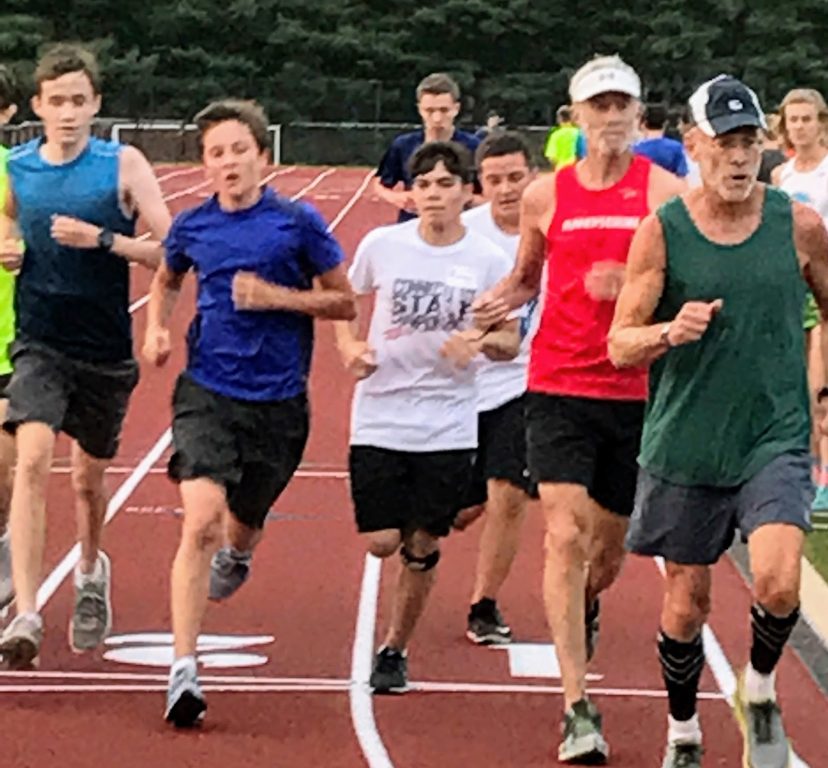
Ninth-graders prepare to pass the Burfoot brothers (Amby in red and Gary in green). Courtesy photo
In heat 9, I take the inside lane, and set out on our appointed rounds, anxiously checking my wristwatch every 100 meters or so. How long has it been since I’ve run a track race? At least 10 years. My brother, 68, runs at my side. “A little too fast,” he says at the mile. But we’ve clocked a 7:55, close enough.
The next three laps, I’m aware of two things. First, there’s a kid practically bumping shoulders with us who is running way over his head. His breath sounds deep and raspy. “I’m done,” he says suddenly on the sixth lap, collapsing to the infield. Second, I’m working hard while some of the ninth-graders a stride back appear to be going easy.
On the last lap, a handful of them blast around my brother and me. We had been running roughly 120 seconds per lap, but they cover the final 400 in 80 seconds. My brother hits 93. I stagger to the finish with a 110 for the last 400, and 15:45 for the two miles.
“For a lot of the freshman, I think the coaches’ challenge illuminates what cross-country means to all of us at Hall,” team co-captain Erik Zeiberg emails me the next morning. “I know they wouldn’t say this out loud, but I’m confident many of them were thinking, ‘Wow, I didn’t know running could be so much fun!’”
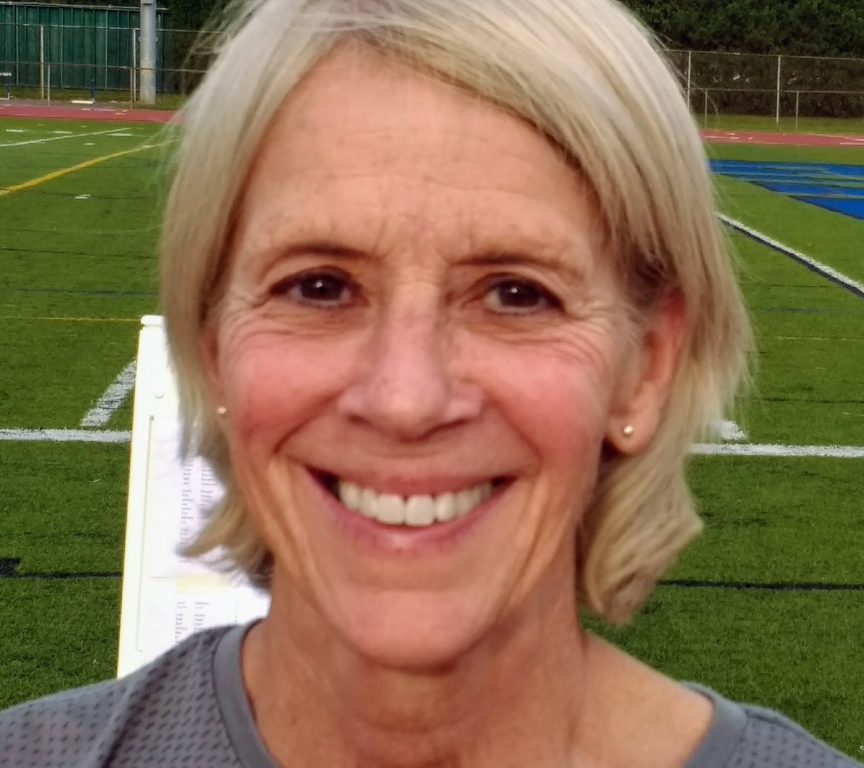
Betty Remigino-Knapp. Courtesy photo
Heat 11 is led by an Olympian … or the next closest thing. Sixty-two-year-old Betty Remigino-Knapp, recently retired as athletic director at Hall, carries a last name that’s much revered around Hartford. In 1952, her father, Lindy Remigino, won the Olympic 100-meters. Betty’s no slouch herself, easily running 9:00 pace to lead her group.
A few minutes later, Jeff summons everyone to the center of the football field. “Three, two, one, quiet,” he says, raising his right arm. “I hope you had fun tonight,” he continues. “I hope you’re happy with your time, and enjoyed cheering for your teammates. Most of all, I hope you’re thinking about your goals for this season.”
That seems possible. The huge space – football field, track, bleachers, and surrounding soccer fields – has gone completely still. There’s not a word, whisper, or rustle.
Like what you see here? Click here to subscribe to We-Ha’s newsletter so you’ll always be in the know about what’s happening in West Hartford!


